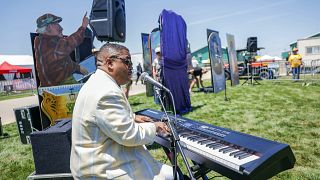USA
Historic Black communities have dwindled from their once-thriving existence in the United States and efforts to preserve what's left encounter complicated challenges.
The incorporated towns were founded by formerly enslaved people and often had their own churches, schools, stores and economic systems. A decrease in the number of these settlements is due in part to amended local ordinances, uneven tax rates, home devaluations and political fights that leave communities vulnerable to developers and rampant gentrification.
Researchers estimate fewer than 30 historic Black towns are left, compared to more than 1,200 at the peak about a century ago. While some enclaves stand up to outside forces looking to repurpose the land, others find compromise that keeps the historical legacy alive.
In Florida, one of the first incorporated self-governing Black municipalities in the U.S. was Eatonville, established in 1887. Located just 24 miles (39 kilometers) north of Disney World, the key challenge for present-day residents is the Orange County Public School Board, which owns 100 acres (40 hectares) of property in the middle of town.
The land was once home to Robert Hungerford Normal and Industrial School, established in 1897 as a school for Black children. In 1951, it was sold to Orange County Public Schools.
In March, a private developer interested in building commercial, office and residential units on the land terminated a sales contract with the district after protest from residents.
The school system said in a statement in March that it wouldn’t consider any further bids for the land. The Association to Preserve the Eatonville Community has sued the school district to safeguard the land for educational purposes.
“There are four things that have kept Eatonville: its faith, its family, its education and its civic pride,” said NY Nathiri, a third-generation Eatonville resident and founder of the association.
Nathiri smiles as she reminisces about her idyllic childhood and her family’s history in the town — from her grandfather moving there at the beginning of the Great Depression, to her aunts’ close relationship with author Zora Neale Hurston.
Descendants of the community work to boost its economy and preserve the local heritage and culture, put on display at the town's annual ZORA! Festival.













00:51
Portugal has to “pay costs” for its colonial past - President
01:45
Black Chicagoans feel left behind as millions marshaled for migrant crisis
02:20
Beyoncé's 'Cowboy Carter' shines light on Black artists in country music
02:20
Choro, Brazil's first urban popular music genre, gets national recognition
02:20
Tyla talks anticipated debut album, shining a light on music out of Africa
01:00
Louis Gossett Jr., 1st Black man to win supporting actor Oscar, dies at 87